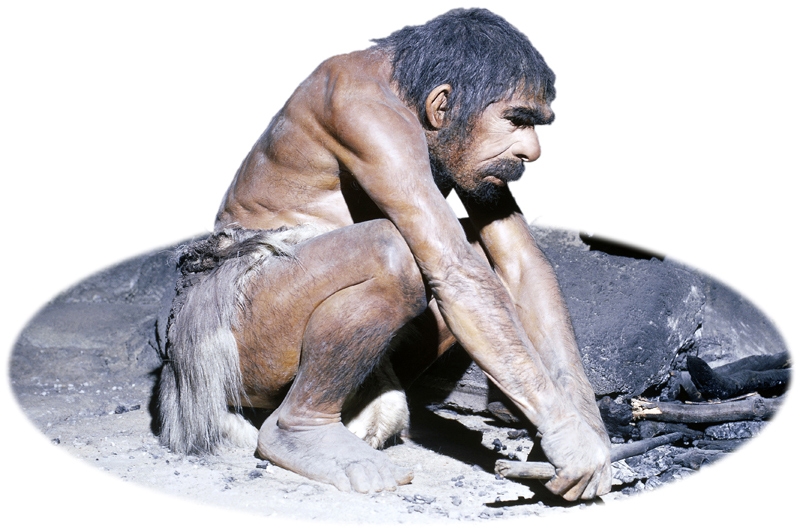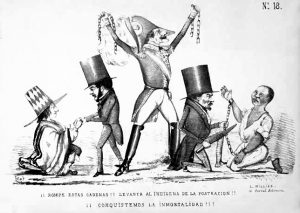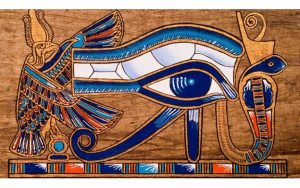The human species that today makes astounding advances in technology, and particularly in the medical field, did not exist four million years ago. In fact, hominids of that period were very different from the modern species in many ways. How did humans evolve to become today’s humans? How did Homo sapiens become so innovative? For one, they developed favorable qualities that were essential for adaptation and a thriving existence.

Homo sapiens derived from a form of early humans called Neanderthal. Unlike modern humans, characteristics of the Neanderthal included occipital buns and protruded brow ridges.1 One important facial feature of the Neanderthal was their large nose for “humidifying and warming cold, dry air” before it reached the lungs.2 Modern humans do not have this characteristic due to the fact that the Neanderthals lived in much harsher conditions. Thanks to the work of archaeologists and anthropologists, we know a great deal about the life and world of Neanderthals. The first fossils of these humans were found in France, and scholars have since called these humans Cro-Magnon. They created innovative tools from bones and antlers for hunting. This enabled them to survive and thrive in their environment. They even created artwork “in the form of decorated tools, beads, ivory carvings of humans and animals, clay figurines, musical instruments, and cave paintings.”3

Homo sapiens originated from East Africa. From there homo sapiens have migrated to all of earth’s main land masses. By taking advantage of land bridges, they have spread to Indonesia, New Guinea, Australia, and the Americas. Another contributing factor to the spreading of humans was the recent major Ice Age. The freezing of the oceans’ waters around the polar caps lowered the sea level, which exposed land bridges between land masses that were otherwise under water. For example, the connection between Calabria and Sicily had a sea level around -126 meters.4 They were able to adapt to the different environments due to their larger brain capacities, hence more intelligence. Having the knowledge that they had, they were able to create warm clothes and shelters to survive under various harsh conditions in the regions they occupied. Since they were nomadic people, there was no economic prosperity during the Paleolithic era. This was due to the fact that they never inhabited an area for a long duration of time. They were foragers; they scrapped up whatever they could find for survival, so there was no time period in which they could accumulate wealth. With that being said, that meant that there were no social classes. Instead, they lived an egalitarian lifestyle. While the men hunted, the women gathered. This method sustained their existence until the Neolithic Revolution, which domesticated both plants and animals.
The evolution of earlier hominids to Homo sapiens opened the door to a species capable of more advanced thinking about their surroundings and survival. The human race has since continued to thrive to the present. Without their innovative tools, body structures, and eventually domestication of plants and animals, Homo sapiens would not have been able to produce the advancements in technology and sciences that we have available today.
- Markus Bastir, Paul O’Higgins, and Antonio Rosas, “Facial Ontogeny in Neanderthals and Modern Humans,” Proceedings of the Royal Society B: Biological Sciences 274, no. 1614 (May 7, 2007): 1125–32. ↵
- Todd C. Rae, Thomas Koppe, and Chris B. Stringer, “The Neanderthal Face Is Not Cold Adapted,” Journal of Human Evolution 60, no. 2 (February 2011): 234–239. ↵
- “Evolution: Humans: Origins of Humankind.” Accessed September 10, 2016. http://www.pbs.org/wgbh/evolution/humans/humankind/o.html. ↵
- Fabrizio Antonioli, V. Lo Presti, M. G. Morticelli, M. A. Mannino, Kurt Lambeck, Luigi Ferranti, Catriona Bonfiglioli, et al., “The Land Bridge between Europe and Sicily over the Past 40 Kyrs: Timing of Emersion and Implications for the Migration of Homo Sapiens,” Rendiconti Online Societa Geologica Italiana, 2012. https://openresearch-repository.anu.edu.au/handle/1885/71477. ↵



99 comments
Emily Jimenez
Originally, I thought Neanderthals were the least developed form of humans. This might be true in some aspects, however, what their body was able to do to keep them alive is amazing! I never knew that they had large noses for humidifying and warming cold, dry air before it reached their lungs. Once we evolved we no longer needed these characteristics because our brain did all of the evolving for us. I still think this physical aspect is amazing compared to our human bodies now.
Cristian Medina-Lopez
I thought the way that this article was written in chronological order made it very easy to understand and read while not sounding like a text book. I found it very interesting how for their time, they were their own engineers creating tools, clothing and other things that helped them survive. This to me was an example of how because of their creativity and curiosity we have what we live in now.
Osman Rodriguez
I remember recently talking about Hominids and the evolution of our species into modern Homo sapiens. It is pretty interesting seeing how this was possible and how we were able to spread across the world. Hearing about how far we have come as a species gives me hope that we can still progress even further. Yet, currently seeing at how this world is going, personally, it feels like we are regressing.
Joshua Breard
I think that this article does a great job of painting the history of man. From taking us through the evolution of man including the tools men would create, I thought it was very informative and very interesting. Especially considering that we all can relate to this article as our “roots.” Well put together that was very informative to those who are foreign to this topic of discussion!
Josemaria Soriano
One of the things I enjoy most is to sit, feel the air, and appreciate what we have achieved. We live in a so turbulent and chaotic society that our achievements as a species go unnoticed, being really ungrateful to what our ancestors have inherited. What do I mean? It is enough to leave our daily box and not observe, as every day, but to appreciate all the things we have achieved. We have been able to see images through a screen, to construct metal objects that advance with just moving the foot, to create a soup just by putting it in a metal box, devices that can make infinite calculations in only microseconds, sounds that can express our desires and emotions! What the human race has achieved is impressive in all its aspects, something we should celebrate, and unfortunately goes unnoticed. That is why I celebrate this article, because it is a pause for our busy life that invites us to appreciate what we have achieved, and unfortunately the current youth seeks to forget. What I find most surprising of the human being is not only what he has achieved, but the background of his achievements. The human being has been able to create things that surpass himself! We have created calculators that can beat Leonard Euler himself. We invented cars that are hundreds of times faster than Usain Bolt. We have built machines that do what nature censures us at birth: flying. We have succeeded in reaching what we saw always distant and seemed something totally unattainable for our race: the moon. The human being always seeks to overcome, and that is what must continue to motivate us. The limit does not exist, we create it and we decide if surpass it or not.
Eduardo Foster
It’s interesting to read these types of articles! I enjoy reading about the past and how people survived back in days as forages. I admire the chronological order you used on the article, it makes it easy to understand. It also interesting how the invention of small stuff such as bone tools , help into the improvement of future species.
Kelley Salinas
Amazing article! Interesting to find out that us humans came from nothing to something. The first Neanderthals lived in worse conditions than we do now. Neanderthals had more prominent noses for humidifying and warming cold, dry air. Fascinating to find out that that human has evolved a great amount. We have developed advanced thinking, tools, technology, gardening, body structures and plants.
Josselyn Arrieta-Meraz
Articles like these are those I enjoy the most, thinking about the past especially over our own human kind simply fascinates me, the fact that we as a human race at one point were like animals we didn’t have the ability to connect pieces together and find solutions for our problems we later were able to adapt and evolve. Over the course of many years humankind and race continue to advance, from technology used in ancient years to technology in modern day. Many downfalls and success came along with it all. But the fact that we as a race are still standing proves a point.
Brianda Gomez
I really enjoy reading articles like this one. Learning about homo sapiens and the environment they lived in. The fact that they lived in harsh conditions but had a large nose that would humidify and warm the cold, dry air before it reached their lungs is amazing. They also created tools from bones for survival. They played a big role in the world we live in today. It is stunning that without them we would not have all of the innovations we have today.
Clarissa Bustamante
It’s cool how you made a history article over something that was pretty much the start of history. I also liked how you explained why humans evolved into intelligent creatures. you also mentioned Neanderthal and I haven’t really heard that word much, but by you mentioning it gave me a better understanding of what it might mean. After reading this it makes me wonder if humans would change again in the future.